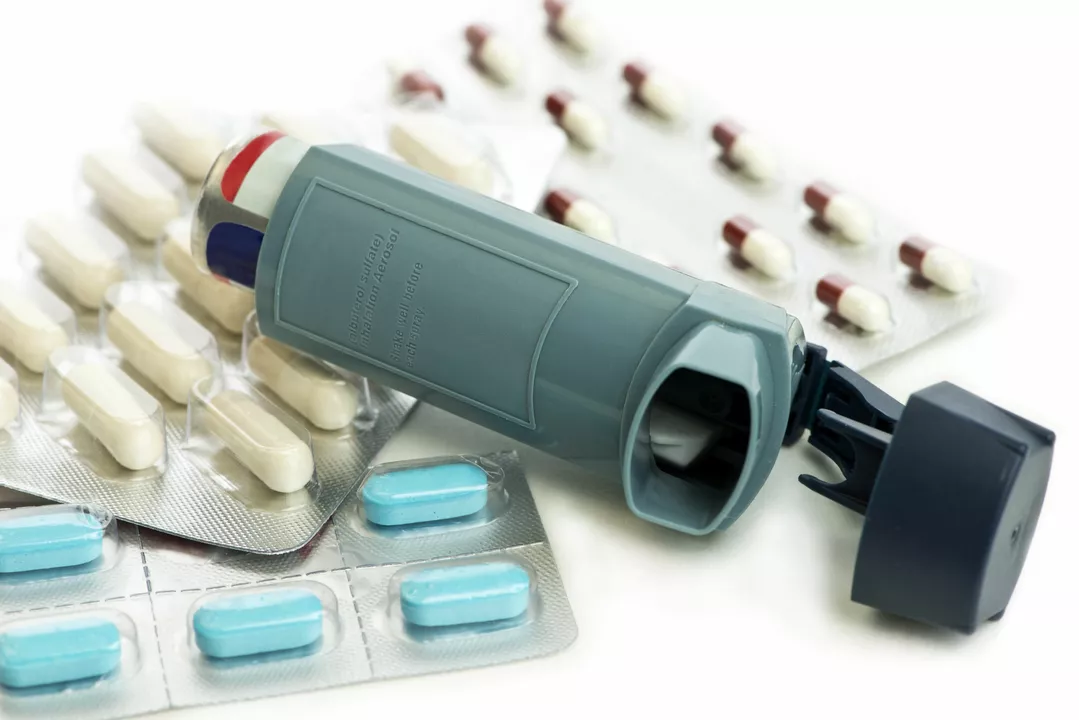Albuterol Myths Debunked: Common Misconceptions about This Asthma Medication

- Colin Hurd
- 27 April 2023
- 6 Comments
Introduction: Debunking Albuterol Myths
As a blogger and asthma sufferer, I know firsthand how important it is to have accurate information about the medications we rely on to manage our condition. One of the most commonly prescribed asthma medications is albuterol, a bronchodilator that helps to open up airways and provide relief from asthma symptoms. Unfortunately, there are many myths and misconceptions surrounding albuterol that can cause confusion and anxiety for those who depend on this medication. In this article, I will address and debunk several of these myths to help you better understand how albuterol works and how to use it effectively.
Myth 1: You Can Become Addicted to Albuterol
One of the most common misconceptions about albuterol is that it is an addictive substance. This is simply not true. Albuterol is a medication used to treat the symptoms of asthma and has no addictive properties. However, it is important to use albuterol as prescribed by your healthcare provider and not rely on it as a "quick fix" for your asthma symptoms. Overusing albuterol can lead to a decrease in its effectiveness, and it's essential to work with your healthcare provider to develop a comprehensive asthma management plan that includes appropriate use of albuterol and other medications.
Myth 2: Albuterol Is Only for Severe Asthma
Another common myth about albuterol is that it is only prescribed for people with severe asthma. This is not the case. Albuterol is often prescribed for people with mild, moderate, or severe asthma, as it can provide quick relief from asthma symptoms like coughing, wheezing, and shortness of breath. That being said, albuterol is not a substitute for long-term asthma control medications, and it's important to work with your healthcare provider to find the right combination of medications for your specific needs.
Myth 3: Albuterol Can Be Used as a Preventative Treatment
While albuterol is excellent for providing quick relief from asthma symptoms, it is not designed to be used as a preventative treatment. Albuterol is a short-acting bronchodilator, which means it works quickly to open up your airways but does not provide long-lasting relief. For long-term asthma control, inhaled corticosteroids and other preventative medications are typically prescribed. It's essential to follow your healthcare provider's recommendations for managing your asthma and not rely solely on albuterol for symptom relief.
Myth 4: Albuterol Has No Side Effects
Like any medication, albuterol can cause side effects in some individuals. Common side effects of albuterol include increased heart rate, jitteriness, and headaches. While these side effects are generally mild and temporary, it's important to discuss any concerns you have with your healthcare provider. In some cases, an alternative medication may be recommended to minimize side effects and provide effective relief from asthma symptoms.
Myth 5: Albuterol Can Be Used to Treat Other Respiratory Conditions
While albuterol is primarily prescribed for asthma, it is sometimes used to treat other respiratory conditions like chronic obstructive pulmonary disease (COPD). However, this does not mean that albuterol is a one-size-fits-all treatment for every respiratory condition. It's crucial to consult with your healthcare provider to determine the appropriate course of treatment for your specific respiratory condition and not assume that albuterol is the right medication for you.
Myth 6: All Albuterol Inhalers Are the Same
There are several different types of albuterol inhalers available, including metered-dose inhalers (MDIs), dry powder inhalers (DPIs), and nebulizers. While these devices all deliver albuterol to your airways, they may have different instructions for use, dosages, and maintenance requirements. It's important to work with your healthcare provider to find the right albuterol inhaler for your needs and to ensure you understand how to use it correctly.
Myth 7: Albuterol Is the Only Asthma Medication You Need
Albuterol is an effective medication for providing quick relief from asthma symptoms, but it is not the only medication available to manage asthma. In most cases, a comprehensive asthma management plan will include long-term control medications, such as inhaled corticosteroids, along with albuterol for quick relief. It's essential to work with your healthcare provider to develop an asthma management plan that addresses your specific needs and includes the appropriate medications to control your symptoms.
Conclusion: Understanding Albuterol and Asthma Management
As an asthma sufferer, I understand the importance of having accurate information about the medications we rely on to manage our condition. Debunking these common myths about albuterol can help you better understand how this medication works and how to use it effectively as part of a comprehensive asthma management plan. Remember to always consult with your healthcare provider about your specific needs and any concerns you may have about albuterol or other asthma medications.




Comments
Mimi Saki
Thank you for pulling all this info together! 😊 It’s such a relief to finally have the myths cleared up, especially when you’re dealing with flare‑ups. Keep spreading the good vibes and accurate facts! 🌟
April 27, 2023 AT 21:00
Subramaniam Sankaranarayanan
Allow me to elaborate on why albuterol is often misunderstood. First, the pharmacokinetics of a short‑acting β2‑agonist dictate that it works within minutes, not hours, which is why it’s labeled a rescue medication. Second, the myth of addiction arises from a misinterpretation of tachyphylaxis – repeated use can blunt response, but this is a physiological tolerance, not a chemical dependency. Third, the idea that only severe asthma patients need albuterol ignores the step‑wise approach adopted by GINA, where even intermittent asthma benefits from a PRN bronchodilator. Fourth, using albuterol as a preventative is nonsensical; its half‑life is too short to sustain bronchiolar stability, contrary to inhaled corticosteroids that modulate inflammation over days. Fifth, side‑effects such as tachycardia and tremor are dose‑dependent; low‑dose inhalations seldom cause clinically significant issues, whereas high‑dose misuse can indeed provoke jitteriness. Sixth, while albuterol is approved for COPD, the therapeutic window differs, and off‑label use without pulmonary function testing can be hazardous. Seventh, device selection matters: metered‑dose inhalers require proper actuation‑inhalation coordination, dry‑powder inhalers need inspiratory flow of at least 30 L/min, and nebulizers deliver continuous aerosol, each with distinct maintenance protocols. Eighth, the notion that albuterol alone suffices neglects the chronic nature of asthma; long‑term control agents like inhaled steroids address airway hyper‑responsiveness that a rescue inhaler cannot. Ninth, patient education is paramount – a misunderstanding of “quick fix” often leads to overreliance and suboptimal disease control. Tenth, clinicians should regularly reassess rescue medication frequency; using albuterol more than twice a week may signal uncontrolled asthma, prompting step‑up therapy. Eleventh, insurance formularies sometimes push certain device types, which can affect adherence if patients are forced into unfamiliar inhalers. Twelfth, proper spacer use can mitigate oropharyngeal deposition, reducing local side‑effects. Thirteenth, remember that theophylline and long‑acting β2‑agonists have their own risk profiles and should not be confused with albuterol. Fourteenth, a comprehensive asthma action plan, co‑authored by the patient, is the best defense against myths. Finally, knowledge empowers patients; debunking these myths is not just academic, it’s a public health imperative.
May 13, 2023 AT 19:46
Kylie Holmes
Love the clarity here! Just a quick shout‑out: if you’re still feeling shaky after a puff, try a slower inhale and hold for 10 seconds – it helps the medication settle.
May 25, 2023 AT 09:33
Jennifer Wees-Schkade
Good job busting those myths, but let me add a note: you must calibrate your inhaler technique every 3 months, otherwise you’re basically blowing smoke. Also, don’t ignore the side‑effects – a racing heart can mask other cardiac issues. If you experience persistent tremors, schedule a follow‑up; sometimes a lower dose or a different device is warranted. Lastly, combine albuterol with a controller medication – relying on a rescue inhaler alone is a recipe for poor control.
June 5, 2023 AT 23:20
Fr. Chuck Bradley
Whoa, this is blowing my mind like a storm of drama!
June 17, 2023 AT 13:06
Patrick Rauls
yeah, i totally get that albuterol isnt a cure‑all 🙈 but it’s still a lifesaver when u need it fast. just make sure u dont overdo it – i once used 4 puffs in a row and felt like my heart was doing cartwheels 😅 also, if ur inhaler feels sticky, give it a good shake and check the expiry – rookie mistake!
June 29, 2023 AT 02:53